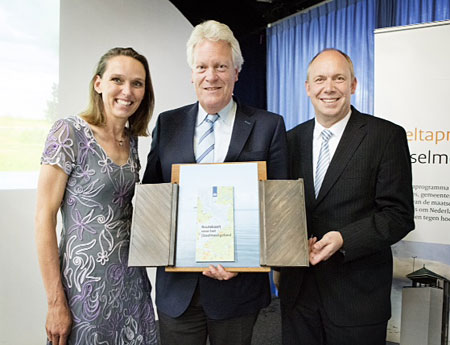IJsselmeer Region presents regional advisory report to the Delta Commissioner
On Wednesday 21 May 2014, Hetty Klavers (Chair of the Zuiderzeeland Water Authority) and Bert Boerman (Provincial Executive Councillor for Overijssel) presented the IJsselmeer Region regional advisory report to Delta Commissioner Wim Kuijken. The Delta Commissioner thanked all the stakeholders in the IJsselmeer Region project for the results achieved and their joint efforts over the past four years.
The regional advisory report was drawn up jointly by all the authorities in the region supplemented by input from civil society organisations and the business community. The recommendations constitute input for the Delta Commissioner’s proposal for the Delta Decisions and preferred strategies in the Delta Programme 2015. On Prinsjesdag (the state opening of parliament in September), at the proposal of the Delta Commissioner, the cabinet will present the Delta Programme 2015 to both houses of parliament.
The IJsselmeer Region also indicated that it would like to continue along the chosen course and that it will be signing an IJsselmeer Pact for the implementation of the decisions and strategy. Delta Commissioner Wim Kuijken supports this intention and will be present when the pact is signed.

Among other things, the advisory report states that for the Afsluitdijk, a combination of drainage and pumping is a considerably less expensive and less drastic intervention than allowing the water level to rise along with the sea level. With this solution, the average winter water level of the IJsselmeer would remain at the current level at least until 2050. This contributes to the safety of the surrounding land. The recommendation of the second Delta Committee to take into account a 1.5 metre rise in water level has thus been abandoned. In around 2050, the best way of discharging water from the IJsselmeer into the Wadden Sea will be re-examined. It is currently already clear that after 2050 as well, it will not be cost efficient to allow the water level of the IJsselmeer to rise fully along with the sea level. The placing of additional pumps is less expensive. Allowing a small rise in the water level may, however, be cost efficient after 2050. This option will therefore remain open in case it does prove cost efficient and necessary. Regarding the other lakes in the IJsselmeer region, no rise in the water levels is being considered.
The IJsselmeer region supplies a large proportion of the northern half of the Netherlands with fresh water. Among other things, the water is used as drinking water by over one million people, it is used in agriculture and to secure the water supply of the water authorities. Climate change could lead to longer periods of drought so that less water may be available in the summer months. In the regional advisory report for the IJsselmeer region, the authorities state that they would like to deal with this by increasing the water supply and reducing the demand for water. A robust freshwater supply can be created by implementing a cohesive set of measures for the main water system, the regional water systems and for users. The measures will be implemented in phases (adaptive delta management) because how the climate will develop is subject to uncertainties.
Flexible management of the water levels of the IJsselmeer, Markermeer and the southern Randmeren (peripheral lakes) contributes to increasing the water supply. Flexible water-level management means that the summer target water level can vary within a particular margin. Given that the winter water level will remain unchanged, flexible water level management has no effect on water safety. It offers water management authorities the possibility to create a buffer when a water shortage is forecast, and to use this buffer if a shortage occurs. And, if still more water is needed, the water level can be allowed to drop further, temporarily. At the same time, all stakeholders are looking into the possibilities for limiting the demand for water in the surrounding areas.
The Delta Commissioner will also receive regional advisory reports for the Rhine Estuary-Drechtsteden area, the Rivers, the South-western Delta, the Coast and the Wadden Region.